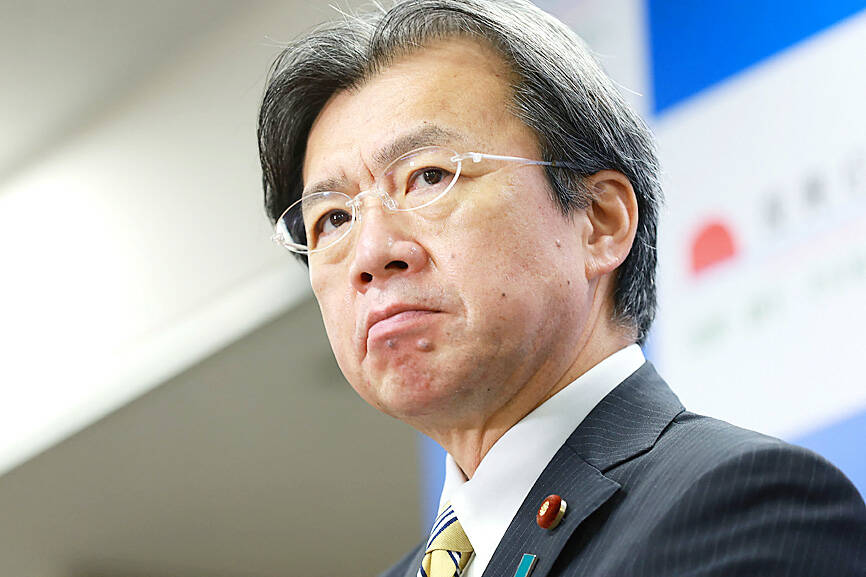Japanese Prime Minister Fumio Kishida yesterday dismissed his fourth minister in two months to patch a scandal-tainted Cabinet that has raised questions over his judgement of staff credentials.
Kenya Akiba, who was Japanese minister for reconstruction, has faced allegations of mishandling political and election funds, and of having murky ties to the Unification Church, whose cozy political ties and practices surrounding followers’ huge donations have raised controversy.
“I have made a heavy decision and submitted my resignation,” Akiba told reporters after meeting with Kishida.

Photo: AFP
He said he had not contravened any laws in relation to the issues over which he has been criticized.
Kishida tapped former Japanese minister for reconstruction Hiromichi Watanabe as a replacement. Watanabe’s appointment would be made official after a palace ceremony.
Akiba’s dismissal was seen as Kishida’s attempt to remove a soft spot in the administration that could stall upcoming parliamentary work on a key budget bill, including hefty defense spending aimed at bolstering Japan’s strike capability.
Jun Azumi, a senior lawmaker of the main opposition Constitutional Democratic Party of Japan who has criticized Kishida as making other slow decisions on his staff, said on Monday that “four [dismissals] are too much and the prime minister should be held responsible over their appointment.”
Kishida yesterday also replaced Mio Sugita as Japanese vice minister for internal affairs and communications. She has made past derogatory remarks against sexual and ethnic minorities.
Sugita in 2018 said that same-sex couples do not produce children and are “unproductive,” and in 2016 scoffed at those wearing traditional ethnic costumes at an UN’ committee meeting as “middle-aged women in costume play.”
Sugita submitted her resignation saying that she cannot bend her beliefs, while retracting some of her earlier comments, Kishida said.
Kishida had been seen as a stable choice as leader after his victory in July, but his popularity has plummeted over the Liberal Democratic Party’s (LDP) widespread church ties that surfaced after the assassination of former Japanese prime minister Shinzo Abe.
The suspected shooter told investigators that his mother’s donations to the church had bankrupted his family and ruined his life.
He reportedly targeted Abe as a key figure behind the church’s ties to Japan’s LDP-led government.
Revelations have since surfaced about many LDP lawmakers having ties to the church, which has been criticized for allegedly brainwashing followers into making huge donations. A new law passed by the Japanese parliament earlier this month aims to restrict such activities.
Daishiro Yamagiwa quit as Japanese minister of economic revitalization on Oct. 24 after failing to explain his ties to the Unification Church.
Early last month, Yasuhiro Hanashi resigned as Japanese minister of justice after saying that his job is low-profile and only makes the news when he signs the death penalty.

DENIAL: Pyongyang said a South Korean drone filmed unspecified areas in a North Korean border town, but Seoul said it did not operate drones on the dates it cited North Korea’s military accused South Korea of flying drones across the border between the nations this week, yesterday warning that the South would face consequences for its “unpardonable hysteria.” Seoul quickly denied the accusation, but the development is likely to further dim prospects for its efforts to restore ties with Pyongyang. North Korean forces used special electronic warfare assets on Sunday to bring down a South Korean drone flying over North Korea’s border town. The drone was equipped with two cameras that filmed unspecified areas, the General Staff of the North Korean People’s Army said in a statement. South Korea infiltrated another drone

COMMUNIST ALIGNMENT: To Lam wants to combine party chief and state presidency roles, with the decision resting on the election of 200 new party delegates next week Communist Party of Vietnam General Secretary To Lam is seeking to combine his party role with the state presidency, officials said, in a move that would align Vietnam’s political structure more closely to China’s, where President Xi Jinping (習近平) heads the party and state. Next week about 1,600 delegates are to gather in Hanoi to commence a week-long communist party congress, held every five years to select new leaders and set policy goals for the single-party state. Lam, 68, bade for both top positions at a party meeting last month, seeking initial party approval ahead of the congress, three people briefed by

Indonesia and Malaysia have become the first countries to block Grok, the artificial intelligence (AI) chatbot developed by Elon Musk’s xAI, after authorities said it was being misused to generate sexually explicit and nonconsensual images. The moves reflect growing global concern over generative AI tools that can produce realistic images, sound and text, while existing safeguards fail to prevent their abuse. The Grok chatbot, which is accessed through Musk’s social media platform X, has been criticized for generating manipulated images, including depictions of women in bikinis or sexually explicit poses, as well as images involving children. Regulators in the two Southeast Asian

ICE DISPUTE: The Trump administration has sought to paint Good as a ‘domestic terrorist,’ insisting that the agent who fatally shot her was acting in self-defense Thousands of demonstrators chanting the name of the woman killed by a US federal agent in Minneapolis, Minnesota, took to the city’s streets on Saturday, amid widespread anger at use of force in the immigration crackdown of US President Donald Trump. Organizers said more than 1,000 events were planned across the US under the slogan “ICE, Out for Good” — referring to the US Immigration and Customs Enforcement, which is drawing growing opposition over its execution of Trump’s effort at mass deportations. The slogan is also a reference to Renee Good, the 37-year-old mother shot dead on Wednesday in her